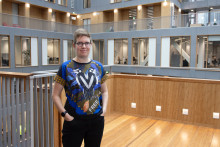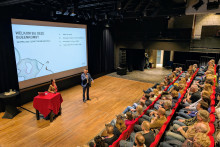Why this initiative?
'It is inspired by similar initiatives in New Zealand and Denmark. There are regular reports in the media of professors who treat their PhD students badly. Before I came to the UT, I also worked in Leiden, so I am familiar with the case there . And of course there are many more examples. The reporting is often about the working atmosphere and excellence, as if they are opposites. The narrative is often: 'Yes, the person did commit those abuses, but excelled in their field'. That is of course nonsense. There is plenty of evidence – including scientific evidence – that if you respect people and give them a safe working environment, that is the best for performance.'
'Too often, kindness and excellence are seen as opposites'
That narrative should change with this initiative?
'Yes, actually we want to set an example with this: it can be done differently. The perception of the academic world is that it is competitive, with high work pressure, unsafe workplaces and hierarchical constructions. This is certainly not the case everywhere, but we definitely want to change the culture for the better. Too often, kindness and excellence are seen as opposites, but they go hand in hand.'
In what way do you give shape to that body of thought?
'The plan is to start a platform in March, with all kinds of contributions on how to make kindness work. For example, a colleague wrote a piece about how to give feedback on scientific articles based on this idea, even if they are subpar. And also think, for example, of the good supervision of PhD students, who of course have a particularly vulnerable position – and a certain relationship of dependence on their supervisor. In addition, we will explain a little more about the concept and what it means in concrete terms. For example, being kind does not mean that you let people walk all over you, being kind is also that you set certain boundaries.'
What are the ambitions?
'We started with a small core team; a few close UT colleagues, but also scientists from Amsterdam and Groningen. Especially from my own direct network. We want to keep that core team small, to keep focus. But we hope that many people will feel called to contribute to the platform, from all universities. After all, it's not about competition, but about cooperation.'
What are your own experiences with this philosophy?
'I was working at the Vrije Universiteit in Amsterdam a year and a half ago, when I went on maternity leave for a few months. Two weeks before that leave, a PhD student started. The timing was unfortunate, but two colleagues from other universities immediately took over the supervision after two weeks – without getting anything in return.'
'I have been working at the UT in the statistics group since last September and everyone is very nice. The atmosphere amongst direct colleagues and the support staff is great. I noticed that last November, for example. The moment I was in the process of buying a house, there was immediately the willingness to arrange an employer's statement. And I also see the willingness to help others with fellow teachers with the educational planning. Within five minutes, someone responds via Signal to take over something, even an exam that takes four hours. That says a lot.'
In the meantime, there is a major movement in the field of 'recognition and rewards'. Does your initiative link up with that?
'I would say more that it has common ground, but it's not the same. Recognition and Rewards is mainly focused on the career paths, that you don't have to excel in everything as a scientist. And then you have to be careful that a policy is not set up that every scientist has to become a kind of jack of all trades and must excel in education, research and valorisation. Kindness and Excellence is about behaviour, culture. That in academia the law of the strongest does not apply. It doesn't have to be a dog-eat-dog world.'






